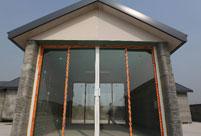 Versatile dog
Versatile dog
 Ni Ni covers BAZAAR JEWELRY
Ni Ni covers BAZAAR JEWELRY
 Cherry blossoms reach peak bloom in Washington D.C.
Cherry blossoms reach peak bloom in Washington D.C.
 Top Chinese fashion icons in foreigners' eyes
Top Chinese fashion icons in foreigners' eyes
 Asia's largest business aviation exhibition to be held in Shanghai
Asia's largest business aviation exhibition to be held in Shanghai
 World's top-rated luxury hotels
World's top-rated luxury hotels
 Wu Jing, Xie Nan to hold wedding on May
Wu Jing, Xie Nan to hold wedding on May
 London Cake International attracts tourists
London Cake International attracts tourists
 Let's dance in harmonic Shaanxi
Let's dance in harmonic Shaanxi
 Christie's to auction dazzling diamonds
Christie's to auction dazzling diamonds
STOCKHOLM, April 18 -- In Sweden's second largest city Gothenburg, six-hour work day is to be tested this year among the municipal government's staff to see if the shorter working time would improve the employees' efficiency and health, and also to eventually reduce costs for the government.
In the Gothenburg municipal government, part of the staff are going to work for six hours per day with their present salaries unchanged, while a control group consisting of people sticking to the traditional eight-hour work day will also be set.
The test is expected to start before summer this year and will end after one year, during which time University of Gothenburg will "closely follow" the project and evaluate the result in the end.
"Then potential policy changes may be made according to the findouts from this test," said Mats Pilhem, Left Party Deputy Mayor of Gothenburg to Xinhua.
He also told Xinhua that a Toyota repair centre in Gothenburg has implemented six-hour work day for twelve years and the outcome has been "satisfactory".
"This serves as a successful example that such work mode can be replicated elsewhere," Pilhem commented.
The Gothenburg government will make several tests in work time to "find new ways of developing social equality, innovations, work efficiency, social security and welfare."
FOR EFFICIENCY OR ELECTIONS?
After the news about the six-hour work day test was released, the Swedish Radio started a vote on its website, where over 800 people have expressed their opinions on what they thought of the six-hour work day by voting: 73 percent are supportive, 22 percent of the people do not consider it as a good idea while five percent are uncertain about it.
Karin Persson, who worked for state administration before getting retired, said to Xinhua that she believed that with seven hours every day she would be able to finish what could be done in eight hours, but six hours are not enough for her to complete the same amount of work.
"Six-hour work day will create more job opportunities and more people can take part in the work," Ulla Andersson, spokeswoman for economic policy of the Left Party, was quoted as saying by the Swedish evening post Aftonbladet.
She added that it can also reduce the risk of injuries at work which often happen when people are working late.
However, the proposal on implementing six-hour workday was accused as being "populist" by Maria Ryden, from the Moderate Party, which is the Lefts' opposition.
"I don't think it is an honest policy. This is a populist policy," Ryden was quoted as saying by the newspaper Metro, adding that it is the election year and the policy "has nothing to do with quality".
Meanwhile, Pilhem told Xinhua that the news is not for the election year, but something he "has been wanting for a long time".
"For the past 100 years, every time, we attempt to make changes for work time and vacations, they are always against us!" he said.
Over the past few years, the Left Party has raised the subject of six-hour work day several times and in early 2012, a workgroup was set to work on it.
In January this year, the Left Party released a plan on the subject for the first time, in which the party said that they aimed to realize the implementing of six-hour work day in Sweden within 10 years or to first cut the working hours down to seven hours a day within five years, said the Swedish daily SVD.
According to the Left Party's plan, the yearly cost would be 11-12 billion Swedish kronor (about 1.7-1.8 billion U.S. dollars).
FOR EMPLOYMENT RATE?
In fact, six-hour day was first mentioned almost at the same time when Sweden started to implement eight-hour work day in 1971.
At that time six-hour work day was considered to be able to achieve gender equality as if people could work for shorter time everyday, females would have more time to take care of their children and family.
Furthermore, it was also seen as a solution to the massive unemployment in Sweden as more labor force would be needed if each worker worked for shorter time.
However, based on Swedish data, "no long-term relation was found between hours per worker and employment", said the Swedish online daily the Local, referring to a Swedish study, adding that there are also other studies arguing that fewer working hours do nothing to help employment rates.
Besides, at present, many Swedish employers are having difficulty finding competent staff, for example in the manufacturing industry, where a lack of technical know-how among job seekers has slowed down production.
"Jobs aren't commodities that you can just share with someone else", as in Sweden only five percent jobs do not require special knowledge, which is among the lowest share of the EU countries, said the Local.
FOR SOCIAL EQUALITY?
Part-time workers compared with people working full-time often do not have a good pay and according to a Swedish government report in 2005, 41 percent working women in Sweden have a part-time employment.
Thus if six-hour work day is introduced in Sweden, many Swedish women would live in a better financial circumstance.
However, if the salary for part-time employees remains the same after Sweden implements the six-hour pattern, "it would be too unfair for the part-time employees", said an anonymous employee of the library in the southeastern city Kalmar.
In 2010, Paul Fuehrer, a Swedish sociologist, suggested that the concept "welfare" should not only be reflected on the material level, but also include time as a kind of wealth, reported the Swedish daily Dagens Nyheter (DN).
In Fuehrer's study, most of the 130 people he interviewed from the Stockholm area would rather choose shorter working time with lower pay than the present working time with higher pay.
Also there are people who try to prove that six-hour work day is a general trend of the world as working hours have been reduced from the 14 hours per day in the 19th century to eight hours today.
Thommy Thomelius, who lives in Kalmar and works for nine hours every day with sales, told Xinhua that he thought six-hour work day would be a good idea as to start at nine and finish at three would be most efficient way for him.
Meanwhile, Thomas Bjorklund told Xinhua that if six-hour work day is implemented there should be no break included during the working hours.
Besides, he suggested that it would be even better if five work days could be changed to four days so that there would be more time spared for his family together.
TOO EXPENSIVE FOR SWEDEN?
However, when it comes to the actual plan to carry out the six-hour work day pattern, there are people who consider it as too expensive for Sweden. But also there are people arguing that one year's profit of Swedish banks would be able to support that.
Deputy mayor Pilhem certainly believed otherwise, and he showed confidence in Sweden's fiscal advantage by saying that "we have money in Sweden (to support that)!"
According to Pilhem, it is the central government that has the final say on whether to implement the six-hour work day pattern, but he said he was "optimistic" that it would happen in the near future.
"I believe, sooner or later, it will be implemented," he added.
In Sweden, today a working week is from Monday to Friday and people work for eight hours on each working day. Apart from lunch break, people usually also get to enjoy two "FIKA" breaks, or the coffee breaks both in the mid mornings and afternoons.
 Cherry blossoms hit peak bloom in Washington D.C.
Cherry blossoms hit peak bloom in Washington D.C. Children in ancient costumes learn Zhusuan
Children in ancient costumes learn Zhusuan Tens of thousands celebrate Water Splashing Festival
Tens of thousands celebrate Water Splashing Festival A bite of China II whets the appetite
A bite of China II whets the appetite Chinese frigate completes its 14th escort mission
Chinese frigate completes its 14th escort mission Let's dance in wealthy Shaanxi
Let's dance in wealthy Shaanxi A date with 798: feel the art around you
A date with 798: feel the art around you 3D-printed houses built in Shanghai
3D-printed houses built in Shanghai World largest scale of umbrella dance
World largest scale of umbrella dance The backstage of the Fashion Week
The backstage of the Fashion Week College students in Han costumes
College students in Han costumes Postgraduate works as waitress
Postgraduate works as waitress Life in a Lahu village in Yunnan
Life in a Lahu village in Yunnan An orphan’s wedding
An orphan’s wedding Hollywood documentary brings Diaoyu Islands truth to new audience
Hollywood documentary brings Diaoyu Islands truth to new audienceDay|Week|Month